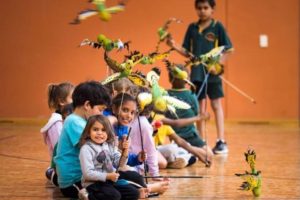Mother tongues need protection
 Mother languages spoken by migrants and indigenous groups are under threat because of the rise of nationalism and increasing barriers to migration, according to a group of leading language researchers.
Mother languages spoken by migrants and indigenous groups are under threat because of the rise of nationalism and increasing barriers to migration, according to a group of leading language researchers.
This week saw the marking of International Mother Language Day, launched by UNESCO in 1990 – a reminder that children of migrants and indigenous people have an international right to speak, grow up with, and celebrate their own heritage languages, wherever they reside.
Language researchers Nathan Albury, Susana Eisenchlas and Andrea Schalley say that the rise of populist nationalism and the threat of walls between sovereign neighbours is a threat to mother tongues.
“With religious profiling, and suspicion of regional integration, we worry what the resulting political milieu means for migrant and Indigenous languages. Language is, after all, a salient index of culture,” they say writing for the ABC’s website.
“An assault on cultural diversity is synonymous with an assault on linguistic diversity,” the researchers say,
They say a key current question is whether minority communities, whose language and culture differ from the mainstream but who are rightfully accepted as new migrants and citizens, should be encouraged to retain their languages.
The researchers – Nathan Albury, a critical sociolinguist from Hong Kong Polytechnic University, Dr Susana Eisenchlas, a senior lecturer in linguistics at Griffith University, and Andrea Schalley, an associate professor at Griffith – argue they should.
“Our reasoning should not simply be branded as a political nod towards the left. Supporting the diversity of mother tongues in our communities is much more than politics. It has legal, economic, and cognitive implications for our children.
“The Convention on the Rights of the Child requires that governments ensure ‘the development of respect for the child’s parents, his or her own cultural identity, language and values, for the national values of the country in which the child is living, the country from which he or she may originate, and for civilizations different from his or her own’,” the researchers say.
“This does not mean creating communities that cannot speak to each other and eroding national cohesion, as is often the concern of anti-multiculturalists. In fact, it means the opposite: building linguistically mobile, bilingual, contemporary citizens in touch with their heritage and their citizenship in equal measure,” they say.
“A total of 196 states are party to the convention. Upholding international law includes upholding this promise to speakers of mother languages different to the mainstream.
“What is more, languages enrich not just society but also our socioeconomic mobility.
“Bilingualism creates a highly skilled workforce ready to engage the world’s economic and political challenges in the very languages of those challenges. What better way to gather intelligence about North Korean threats than through Korean, or to land a Chinese contract than through Mandarin?
“That’s why bilinguals often earn more,” the researchers say.
They say there is growing evidence that bilingualism is good for the brain; that bilinguals are agile, abstract, and creative thinkers, and evidence suggests that bilingualism even delays cognitive impairment later in life.
Helping communities retain their mother tongues and become mobile bilinguals therefore seems moral, lucrative, and wise, they say.
“Unfortunately, not all our leaders agree as they see multilingualism in society as threatening nationhood,” the researchers say.
But in Australia, legislation has finally been passed to protect and revive Aboriginal languages, similar to the mounting pressure in Canada, and Bolivia operates a policy of plurilingualism, with literacy programmes in 36 Indigenous languages.
“On International Day of the Mother Tongue, we call on all our communities not to just celebrate diversity of languages, but recognise the vital contributions they can make,” the researchers say.
“Our call is beyond politics. We have a responsibility to our children, their rights, their socioeconomic opportunities, their cognitive development, and their well-being to champion their bilingualism,” they say.
Laurie Nowell
AMES Australia Senior Journalist












